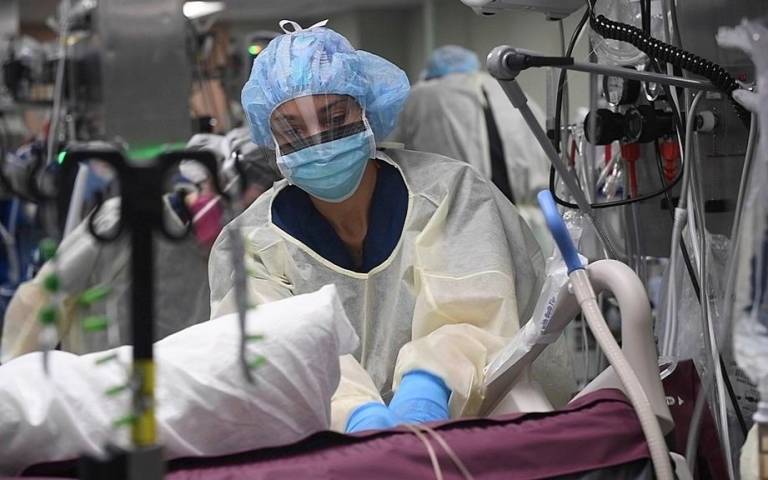COVID-19: National PTSD screening programme urgently needed
29 June 2020
Patients affected by COVID-19 need to be urgently screened for post-traumatic stress disorder (PTSD), and receive regular check-ups for at least a year. The ‘call to action’ is led by UCL psychiatrists and psychologists, who formed the ‘COVID Trauma Response Working Group’.

The group, which also includes mental health experts from the NHS, Oxford University, Kings College London and the University of Haifa, Israel, calls for a co-ordinated UK ‘screen and treat’ service, to ensure all survivors have equal access to specialist mental health support.
Today (Monday 29 June, 2020) the ‘COVID Trauma Response Working Group’ (CTRWG) has published evidence-based clinical guidelines designed to inform NHS planners and clinicians of the principles for addressing the mental health needs of people who have been critically ill with COVID-19 infection.
The recommendations derive from similar epidemics, mass casualty events and critical care settings. The CTRWG warns that without immediate national action, many COVID-19 patients and their families face the prospect of long term mental health consequences.
In line with other infectious outbreaks, the experts estimate that rates of mental health problems in survivors of severe COVID-19 illness to be 30% for PTSD, 15% for depression and 15% for anxiety disorders.
In launching the guidelines, the group states: “The mental health needs of survivors of severe COVID infection need to be taken as seriously as their physical health needs.”
Key recommendations
- To actively monitor and provide timely treatment for patients with severe COVID-19 infection for mental health problems including post-traumatic stress disorder.
- Set up a national “screen and treat” service, managed through regional mental health screening programmes either within hospitals or in the community.
- Set up specialist psychological trauma services to facilitate the delivery of “screen and treat” programmes.
- Severe COVID-19 patients to receive regular check-ups for at least a year.
Dr Michael Bloomfield (UCL Psychiatry), one of the guideline authors, said: “Given the very frightening and invasive nature of the COVID-19 critical care experience, the imminent risk of death and the potential for long-term medical complications, those most severely affected by COVID-19 are likely to be at high risk of developing post-traumatic stress disorder and other stress-related mental health difficulties.
“There may also be features unique to COVID-19 and its pandemic status that exacerbate its psychological impact, such as being isolated from family during and after hospital admission. Failure to deal with this immediately could lead to serious long term mental health difficulties.
“We have set out a number of principles of screening and active monitoring for PTSD, and other stress-related adverse mental health outcomes in survivors of severe COVID-19 illness. These principles include making contact with survivors of severe COVID-19, asking how they are doing, using a screening instrument and following-up those at high risk.”
At the moment there is no uniform approach to monitoring the mental health of severe COVID-19 patients. Most likely a patient would need to self-refer to a GP or to an Improving Access to Psychological Therapies (IAPT) service.
The CTRWG guidelines explain how the ‘screen and treat’ programme should be set up, and provides a series of best practice steps to both minimise trauma during COVID-19 infection and ICU, and how patients should be assessed and monitored before and after being discharged from hospital.
As a minimum, this includes a full psychological clinical assessment prior to discharge and within four weeks of discharge a structured mental health assessment using established screening tools for depression, anxiety, PTSD, cognitive and health-related impairment.
Co-author, Dr Sharif El-Leithy, St George's Mental Health NHS Trust Traumatic Stress Service, said: “The guidance is especially relevant to people who are treated in hospital critical care units or require any form of mechanical ventilation.
“This typically will include people treated in Intensive Care Units (ICU/ITU’s) and High Dependency Units (HDU’s).
“It may also be relevant for people who develop less severe COVID-19 illness, and are treated in other in-patient settings such as respiratory wards.
“Relatives of people admitted to hospital for severe COVID-19 illness may also experience psychological trauma, such as seeing a deeply sedated and ventilated relative via video link from hospital, and so may also benefit from screening too.”
In general, up to 40% of people discharged from Intensive Care Units report symptoms of anxiety, around 30% symptoms of depression and 20% symptoms of PTSD. These are similar rates to survivors of mass casualty events such as transport disasters or terrorist attacks.
Clinical psychologist, Emeritus Professor Chris Brewin (UCL Psychology & Language Sciences) said: “These are simple practical steps. Past experience tells us that without these efforts to contact people large numbers will fail to receive the right treatment.”
Links
- PTSD 'screen and treat' guidelines
- COVID Trauma Response Working Group
- Dr Michael Bloomfield’s academic profile
- Emeritus Professor Chris Brewin’s academic profile
- UCL Psychiatry
- UCL Psychology & Language Sciences
Image
- Intensive care unit aboard the US hospital ship USNS Comfort. Credit: US Navy photo by Mass Communication Specialist 2nd Class Sara Eshleman. Source: Health.mil CC BY 2.0
Media contact
Henry Killworth
Tel: +44 (0) 7881 833274
 Close
Close

